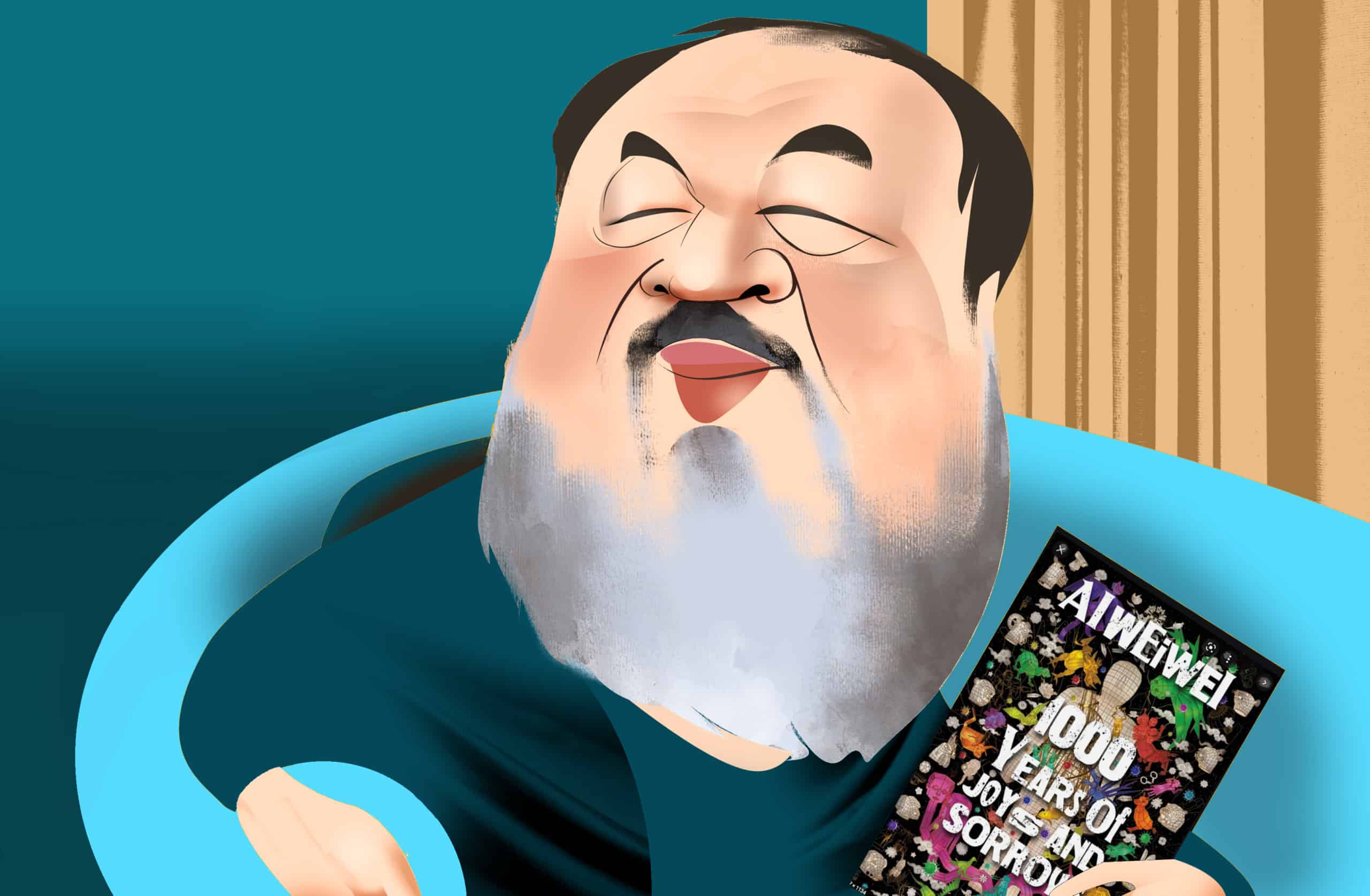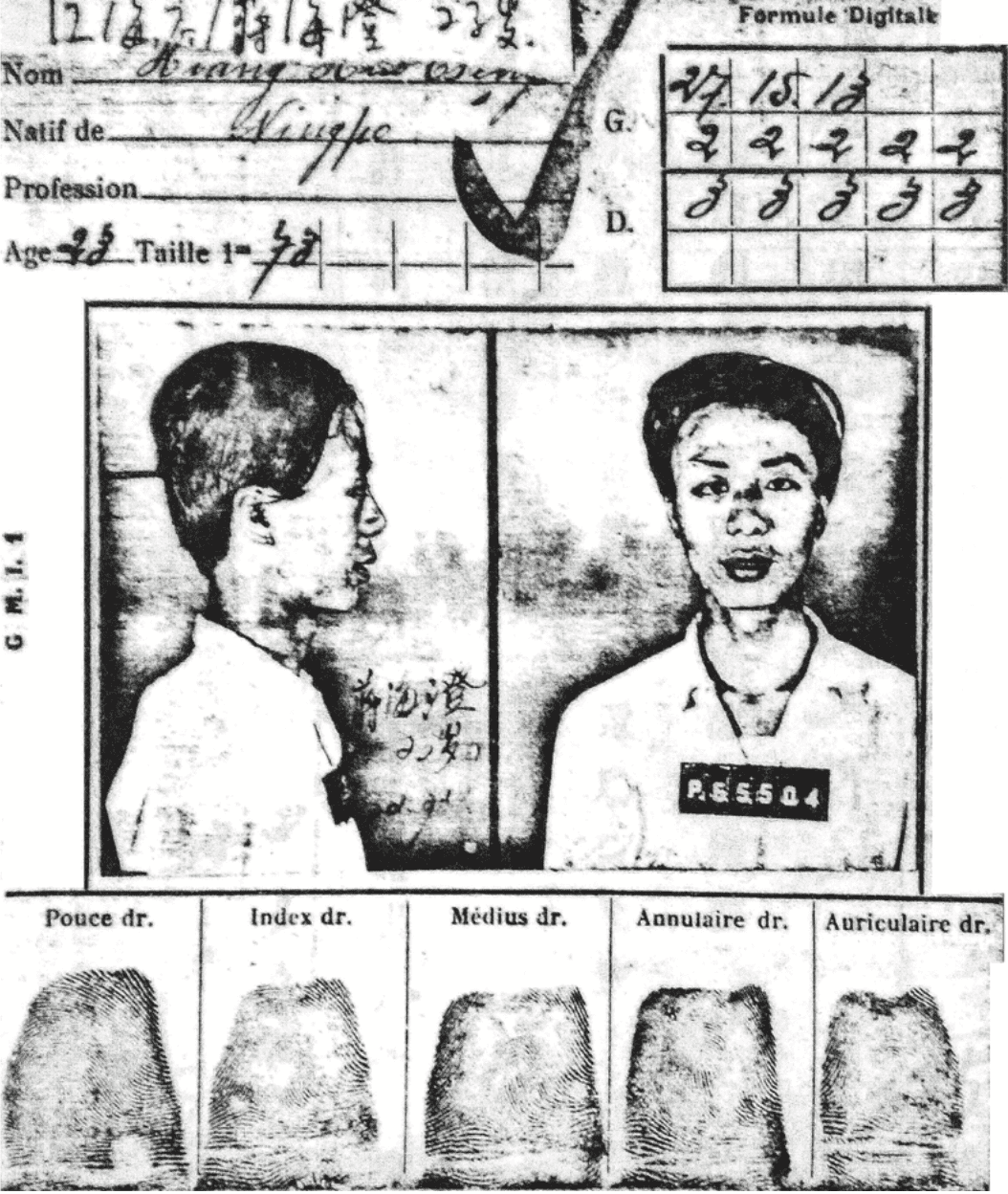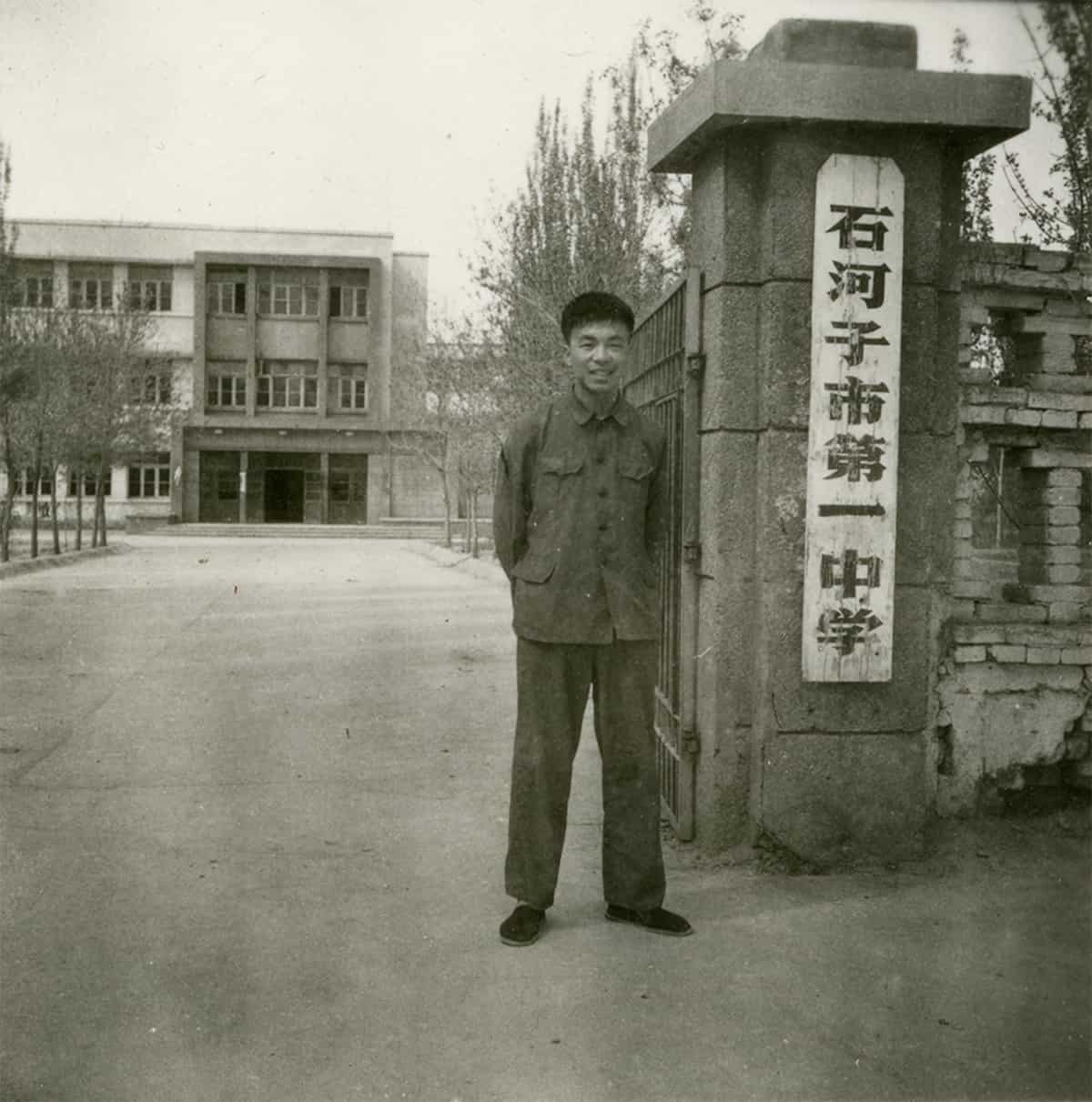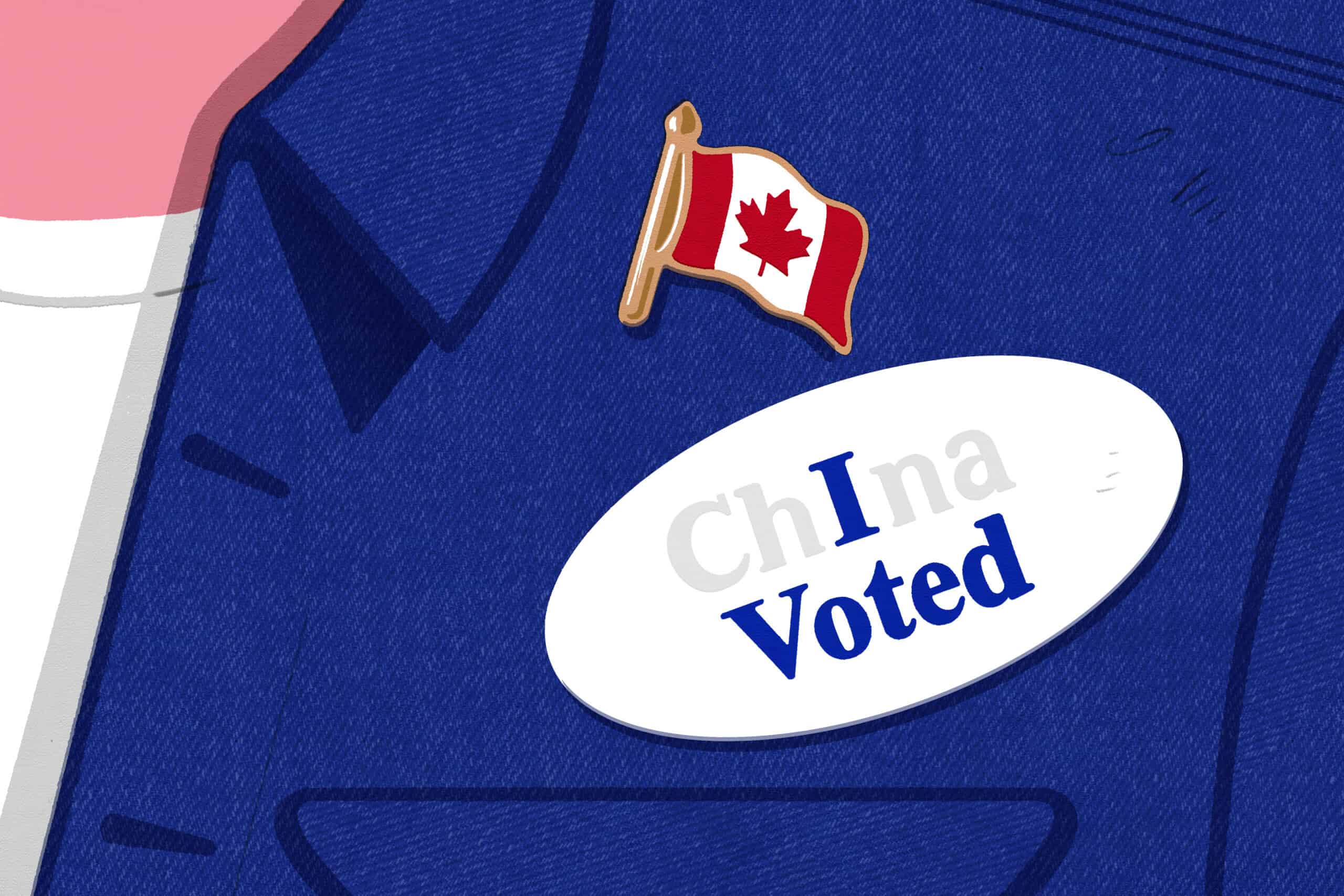
Editor’s Note: Ai Weiwei, 64, is an artist and activist. His sculptures and installations have been viewed by millions around the globe, and his architectural achievements include helping to design the iconic Bird’s Nest Olympic Stadium in Beijing. His political activism, however, has long made him a target of Chinese authorities, and in 2011, he was detained for “inciting the subversion of state power.” He was held captive for 81 days and fined $2.4 million. After his passport was returned to him in 2015, he moved to Europe, where he has been living in exile since. What follows is an excerpt from his newly published memoir, 1000 Years of Joys and Sorrows.
On April 3, 2011, as I was about to fly out of Beijing’s Capital Airport, a swarm of plainclothes police descended on me, and for the next 81 days I disappeared into a black hole.
My son had just turned 2 years old, and during my confinement I began to reflect on my own father, Ai Qing, who had himself spent three years and two months behind bars. I realized I knew very little about his ordeal. The broad strokes, of course, were known to me: In 1932, he had been arrested by the Nationalist government for Communist Party activities — although he was not yet a member of the party — that were seen as “damaging the republic,” a vague charge much like the political crime of “inciting the subversion of state power,” of which I would be accused in the following century. During his time in a Shanghai prison, as men around him were facing death and he himself overcame a grave bout of tuberculosis, he wrote more than 20 poems, and when he was released, he started to gain notoriety as a poet.
“Poetry today ought to be a bold experiment in the democratic spirit, and the future of poetry is inseparable from the future of democratic politics,” he declared in the following years, as China’s war of resistance against Japan heated up. “A constitution matters even more to poets than to others, because only when the right to expression is guaranteed can one give voice to the hopes of people at large, and only then is progress possible. To suppress the voices of the people is the cruelest form of violence.”

My father eventually did join the Communist Party and he lived a relatively comfortable life following the establishment of the new regime in 1949. But that all came to an abrupt end first with the Anti-Rightist Campaign in 1958, when my father was exiled to the “Great Northern Wilderness” for “thought remolding,” and then, more severely, in 1967, when under the Cultural Revolution my father was forced to undergo “reform through labor” as part of the Xinjiang Production and Construction Corps. I was about to turn ten when we moved into a dugout alongside rats, and he began his work cleaning the latrines above a cesspit.
The five years we spent in “Little Siberia” have stayed with me always, but it was half a century before I began to take an active interest in and reflect on my father’s experiences, both before and after the Cultural Revolution. Although he and I were not emotionally close, our connection has undoubtedly played a role in determining the road I have taken and the position in which I find myself — an artist living in exile. I have experienced some of the personal struggles and larger political difficulties that he encountered, and like him I have been labeled an enemy of the state. During my own period of enforced isolation, I felt a need to think through my relationship with my father, and I resolved to write an account of his life and mine, and to share it with my son, Ai Lao.
When I was growing up, my father rarely talked about the past. But I have found guidance in his writings. There, he recorded feelings that had lodged deep in his heart, even if those little streams of honesty and candor had no natural outlet on those many occasions when political floods carried all before them. Today, with my father’s faith in poetry as freedom’s ambassador yet to find vindication in China, all I can do is pick up the scattered fragments left after the storm and try to piece together a picture, however incomplete it may be.
A NEW EPOCH?
My father dreamed of being able to fully devote himself to writing, and on the morning of September 25, 1940, Zhou Enlai offered him just that.
At the time, Zhou was the chief officer of the Chinese Communist Party’s administrative arm, and he was eager to see my father join the Communist cause. Mao Zedong had issued a call to “absorb intellectuals on a large scale.” “The policy of winning support from intellectuals is a major precondition for the revolution’s victory,” he stated, and “the pen must unite with the gun.”
Zhou visited the school where my father, now a well-known poet, was a teacher. “If friends such as Mr. Ai Qing go to Yan’an,” he said, referring to the growing numbers of left-wing intellectuals moving to the Communist stronghold, “they will be able to write without distraction, with no need to worry about basic necessities.”
At the time, as people increasingly questioned the legitimacy of the Kuomintang regime, the image of the Communist Party was shifting from agent of disorder to upholder of national interests. Yan’an was touted as a paradise of equality, freedom, and democracy. Basic needs were met by a military supply system based on egalitarianism, and the Communists, rejecting the Confucian ethical code and traditional elite values, were promoting gender equality and popular culture.
My father agreed to the invitation, and Zhou Enlai furnished him with a thousand yuan in travel expenses. After a month-long journey, he arrived in the treeless terrain of northern Shaanxi and was assigned to one of the many caves carved into the hillsides, which provided insulation from the rugged climate.
Unless there was some special need, Father seldom left his cave. In 1941, a relatively relaxed atmosphere still prevailed in Yan’an’s cultural circles, and although the supply of material goods was meager, intellectuals — particularly those of Ai Qing’s status — were accorded certain privileges. Father was issued an Eighth Route Army uniform and a cotton-padded jacket for use in the winter, and every month he received a small stipend. Food, medicine, and boiled water were free. Couriers would bring him mail and collect his letters, and meals were brought to his cave by a soldier from the “Central Kitchen.”
But in July 1941, Zhou Yang, the dean of the Lu Xun Academy of Arts, published an essay entitled “Informal Remarks on Literature and Life,” in which he complained that a number of authors in Yan’an “were proving incapable of writing anything much.” This provoked Ai Qing and four other writers to jointly sign a letter rejecting this accusation, intensifying the latent rift between party ideologues like Zhou Yang and more liberal intellectuals.
A few days later, at dusk on August 11, 1941, Mao Zedong, not yet party chairman but already the dominant political figure in the CCP leadership, paid a visit to the authors of the protest letter. As he made his way down the slope toward Father’s cave, he signaled to his bodyguard to go no farther, then continued alone to greet Father. At this, his first encounter with Mao, Ai Qing found him to be thoughtful, composed, and widely read, quoting with ease from a variety of sources. Afterward, Mao invited him and his neighbors to go down the mountain and have dinner at his quarters, a meal that included bacon, salted fish, and eggs. Mao listened attentively and took notes, laughing and cracking the occasional joke.
But the unpleasantness stirred up by Zhou Yang’s “Informal Remarks” had begun to puncture some of Ai Qing’s illusions about Yan’an. Until that point, he had not fully understood how the CCP operated. The May Fourth spirit embraced democracy, freedom, independence, and equality, but these values were bound to be at odds with the ideological unity, centralized leadership, and collectivism demanded by the Communist Party. In December 1941, Ai Qing channeled his ambivalence into a poem entitled, simply, “Epoch.”
I stand beneath low-hanging eaves
Gazing in awe at the bare mountains
And the endless sky
In the end I feel a miracle is happening
I see something glittering with light
Like the sun it lifts my heart.
Pounding wildly, my heart keeps chasing it
Like a bridegroom hastening to a wedding
Though I know that what it brings is not festive good cheer
Nor the merriment of a vaudeville show
But a sight more cruel than a thousand abattoirs
Still I rush toward it
With all the eagerness a life can muster.
“Epoch” is the most striking work that he wrote during the Yan’an period. The poem affirms a new epoch promised by the fledgling Communist state, but it is darkened by a grim undertow:
No one could suffer more than me
I am loyal to the epoch and commit my life to it, but I am silent
Against my will, like a captive
Wordless on my way to execution.
He could already sense that loyalty to his epoch — service to the emerging power, in other words — would exact a fateful cost, but it seemed that there was no alternative:
I love it more than anything else I have loved
For its arrival, I am willing to hand over my life
Relinquishing everything, from body to soul
Before it I appear so insignificant I’m even willing to lie faceup on the ground
And let its feet, like a horse’s hooves, stamp upon my chest.
The poem captures with uncanny prescience the intersection of dramatic change and personal calamity that would accompany the revolution sweeping across China in the 1940s. But Father could not foresee just how quickly members of the Yan’an cultural community would themselves be trapped in treacherous political currents.

‘A CULTURAL ARMY’
In March 1942, Ding Ling, Yan’an’s most prominent female author, published an essay, entitled “Thoughts on March 8 (Women’s Day),” that drew attention to the inequities and the “silent oppression” facing women in this supposedly progressive community. Ai Qing had been concerned for some time about the criticism to which authors were subjected. When Ding Ling invited him to share his views, he promptly obliged, writing a pithy essay called “Understand Writers, Respect Writers,” in which he staunchly defended the right of authors to express themselves as they saw fit, noting tartly, “A writer is not a skylark, nor is she a singsong girl whose job it is to warble tunes to entertain her patron.”
For Father, freedom of expression was the precondition for any meaningful literary work. “Apart from the freedom to write,” he continued, “authors demand no other privilege. Only when artistic creation is endowed with a free and independent spirit can it give impetus to the mission of social reform.”
Other authors, still more outspoken, targeted the increasing trends toward bureaucratic complacency, factionalism, and a cult of personality. On March 17, 1942, Wang Shiwei completed an essay entitled “Wild Lilies,” exposing the dark shadows in Yan’an society: the disillusionment of the intellectuals, their concerns about the hierarchical system and the privileges that the top leaders enjoyed. His reference to “some rather healthy ‘big shots’ who receive unnecessary and unreasonable perks” struck a nerve. After Mao read Wang’s essay in Jiefang ribao (Liberation daily), he banged his hand on his desk and asked acerbically, “Who’s in charge here, Karl Marx or Wang Shiwei?”

He demanded that the editors admit their fault in allowing such a work to be published and pledge to avoid any such error in the future. As Mao saw it, criticism of the party was no less damaging to the cause than a military defeat, and would serve to weaken morale and even compromise the party’s legitimacy.
In early April 1942, an orderly delivered a letter to Father from Mao: “There’s something I want to talk to you about. Please come over if you’re free.” When they met, Mao began with a stab at humor: “I like to play the patriarch.” Then he went on. “There are a lot of problems now in Yan’an literary and art circles. People are not happy with a lot of the essays that have been published. Some look as though they could have been dropped from Japanese planes, and others belong in a Nationalist newspaper.”
Mao asked Ai Qing’s opinion about what should be done. My father had not given much thought to this, and suggested off the top of his head, “How about we hold a meeting, and you come out and give a talk?” “If I talk, will people listen?” “I will, at least,” he answered.
Two days later, he got another letter from Mao: “Regarding the cultural policy issues that we talked about, please collect for me all the critical commentaries and share with me any insights you have.” For emphasis, he had drawn three little circles under the word “critical.” Ai Qing did not understand what was meant by “critical commentaries,” so he did not try to collect them; instead he wrote down his own views and sent them to Mao.
In his essay, writing from an author’s perspective, he examined the relationship between the creative arts and politics, and considered the questions of what to write and how to write. In the struggle to improve people’s lives, Ai Qing argued, literature and art share the same goals as politics, but literature and art are not an appendage to politics — they are not a gramophone or a loudspeaker for politics. Literature and art’s integration with politics finds expression in their truthfulness: the more truthful the works, the closer their alignment with the progressive political direction of their era.
A few days later, Mao wrote back in response, “Thank you for your letter and your essay. I am keen to discuss them with you. The river is high, so I’ll send a horse to pick you up.”
In April, Mao’s living quarters were still chilly, and the party leader wore an old padded jacket, its sleeves so worn that the strands of padding were exposed. “We read your piece,” Mao told him, “and we’d like to share our reactions.” Ai Qing’s essay had been reviewed by Mao’s colleagues in the leadership, and Mao himself had comments written down on several sheets of paper. The floor was uneven and the wooden table a bit wobbly, so Mao went outside and came back with a piece of tile to slip under one of the table legs. Then he expounded his views, which were not entirely in line with my father’s.
On May 2, the Yan’an Forum on Literature and Art began. During the preceding days, Zhou Yang had drawn up a list of participants, and Mao had sent out an invitation to more than a hundred writers and artists. After lunch, on the appointed day, people gathered in the large conference room of the party headquarters in Yangjialing. Twenty-odd stools had been placed around a long table, on which a white tablecloth had been laid, with two other rows of stools next to the north wall. A wooden armchair, rather than a stool, occupied a central position by the table — clearly designed for the presiding officer.

Mao arrived promptly at 1:30 p.m. and walked around the room, shaking hands with everyone.
“It seems there aren’t many chairs,” Mao remarked as he opened the proceedings. “There just aren’t enough of them. In the future we need to provide a few more armchairs.” In saying this, he was referring obliquely to the comments that had been made about power and privilege in Yan’an. It was not a comment on the need for seats so much as a sardonic dismissal of some people’s complaints about unfairness.
“To defeat the enemy,” Mao went on, “we must rely primarily on the army with guns. But this army alone is not enough; we must also have a cultural army. The first of these armies is led by Commander-in-Chief Zhu, the second by Commander-in-Chief Lu.” By Zhu he meant Zhu De, head of the Communist armed forces, and by Lu he meant Lu Xun, who had died in Shanghai some years earlier but remained a symbol of left-wing activism.
The audience laughed appreciatively. Many of them had not realized until now how much importance Mao attached to the role of literature and art. Until the forum, intellectuals had commonly assumed that culture and revolution advanced in parallel and had equal status; the goal of this meeting was to make patently clear that literature and art had to serve the party, just as soldiers had to obey the orders of their superiors.
Following the first plenary session on May 2, further sessions were held on May 16 and 23, when Mao made his closing remarks. No real consensus emerged among the speakers; writers presented their opinions and argued their cases. Father and Ding Ling both spoke up at various junctures. For much of the time, Mao sat there expressionless and did not intervene even when radical views were expressed.
To defeat the enemy, we must rely primarily on the army with guns. But this army alone is not enough; we must also have a cultural army. The first of these armies is led by Commander-in-Chief Zhu [De], the second by Commander-in-Chief Lu [Xun].
Mao Zedong at the Yan’an Forum for Literature and Art, May 1942
On the last day of the forum, all 109 attendees posed outside the conference room for a group portrait. Just as the photographer was about to close the shutter, a dog ran into the shot. Mao stood up to shoo it away, shouting, “Kang Sheng, get your dog under control!” Everybody laughed. In Yan’an, Kang Sheng was in charge of counterespionage and the capture of “running dogs.”
Years later, as a small boy, I studied the wide-format, black-and-white photograph taken that day. Mao sits in the middle of the front row, Ding Ling four seats to his left. Father stands on the far right, next to Zhou Yang. Like a painting of the Last Supper, the photograph struck a note of poignancy and mystery, and it felt very remote and foreign to me.
After dinner, a hanging lamp was rigged up in the courtyard and everyone moved outside to hear Mao’s closing speech. “Āiyā, this is not easy to do,” Mao could be heard muttering as he looked over his notes. But once he began to deliver his speech, his heavy Hunanese accent held everyone’s attention. “The problem of whom to serve,” Mao said, “is fundamental; it is a question of principle. All our literature and art are for the masses, and in the first place for the workers, peasants, and soldiers.”
“The masses” was one of his favorite concepts, and what he really meant when he used that term was the rank-and-file population, subject to the will and direction of the party. Mao’s speech at the Yan’an Forum on Literature and Art ended up reshaping Chinese intellectuals’ understanding of their mission. He devoted particular attention to issues of a writer’s target audience and the attitude they should bring to their work, explicitly demanding that they cater to the needs of workers, peasants, and soldiers rather than elite readers.
The May Fourth Movement had seen intellectuals as the core of society: they were to shoulder the responsibility for enlightenment and social critique. Mao, on the other hand, believed that intellectuals, rather than seeking to make the people more like them, should make themselves more like the people; they should abandon social critique and devote more time to self-criticism.
The forum had a far more wide-ranging significance than many of the participants had expected, generating a programmatic document that would dictate the fate of Chinese culture for decades to come. With it, the function of intellectuals was fundamentally altered, and novelists, poets, and artists were now all lumped together under the omnibus label “literature and art workers.”
From then on, Ai Qing and his fellow writers found that alternative pathways were closed off to them. An opportunity to exercise their free will might possibly appear after the war with Japan was won, or perhaps it would remain forever out of reach. For now, all arguments had been replaced — suppressed — by the party’s voice and the party line, and their aspirations were reduced to an empty farce. Given the constant threat of political interference, only through opportunism could they win a little living space — and stale mediocrity would be the only outcome.
The Chinese Communist Party and left-wing intellectuals were like two celestial bodies in the solar system: as they orbited, they might at certain moments travel in parallel, but each moved on its own plane, and they inevitably went their separate ways.
The Chinese Communist Party and left-wing intellectuals were like two celestial bodies in the solar system: as they orbited, they might at certain moments travel in parallel, but each moved on its own plane, and they inevitably went their separate ways.
THE THICK FOG
In the years that followed, intellectuals would face increasing pressure to conform, leading ultimately to the Anti-Rightist Campaign in 1957, which marked the end of intellectuals as a force in society. From that time on, Chinese intellectuals were confined to a marginal position, and they have been there ever since.
When I was little and not yet able to read the words, I enjoyed looking at Father’s shelves, which were packed with both literary works and art books. Some of these volumes had eye-catching covers and illustrations: gilded Virgins, prints of Rembrandt’s bronze etchings, buildings and statues from the Classical and Renaissance periods. They all gave wing to my imagination.
I remember, too, poetry collections by Whitman, Baudelaire, Mayakovsky, Lorca, and the Turkish poet Nâzim Hikmet. I was fascinated by the Picasso engravings in a volume of Paul Éluard’s poetry, and early Chinese revolutionary woodblock prints and traditional window papercuts that Father had acquired in Yan’an. When you turned the pages of the books, they would give off a unique aroma, telling you right away that they were from a different time and place.

From an early age, my family and I knew that these books and albums meant the world to Father, for every time he talked about them his face would light up. They helped him forget his worries. But in 1966, as the red terror of the Cultural Revolution began, every little fiber of their linen covers posed a danger to us. During this time, when “politics” invaded all aspects of life, the Chinese people suffered a withering of spiritual life and lost the ability to tell things as they had truly occurred. Everything was shrouded in the thick fog of the dominant political narrative, and any inquiry into fact ran the risk of provoking a backlash too awful to contemplate.
After several home invasions by the Red Guards, Father decided to burn all his books, and I was his helper. We stacked the books up next to a bonfire, and one by one I tore out the pages and tossed them into the fire.
Like drowning ghosts, they writhed in the heat and were swallowed by flames. At the moment they turned to ash, a strange force took hold of me. From then on, that force would gradually extend its command of my body and mind, until it matured into a form that even the strongest enemy would find intimidating. It was a commitment to reason, to a sense of beauty — these things are unbending, uncompromising, and any effort to suppress them is bound to provoke resistance.
Translation by Allan H. Barr.
From the book 1000 YEARS OF JOYS AND SORROWS by Ai Weiwei. Copyright © 2021 by Ai Weiwei. Published by Crown, an imprint of Random House, a division of Penguin Random House LLC. All rights reserved.

Ai Weiwei is an acclaimed artist and political activist from China. Born in Beijing in 1957, he later helped design the city’s ‘Bird’s Nest’ national stadium for the 2008 Olympic Games. In 2011, he was detained in a secret police detention center for 80 days. Since 2015, he has been residing in Europe. @aiww

Allan H. Barr is the author of a study in Chinese of a literary inquisition in the early Qing dynasty, Jiangnan yijie: Qing ren bixia de Zhuangshi shi’an, and the translator of several books by contemporary Chinese authors, including Yu Hua’s China in Ten Words and Han Han’s This Generation. He teaches Chinese at Pomona College in California.



